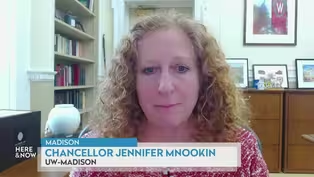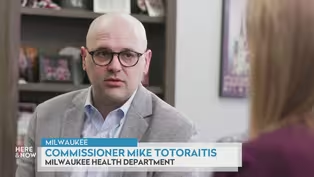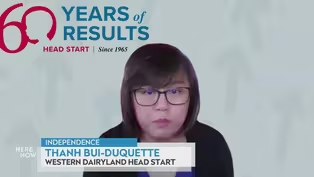Here and Now
Will Hsu on Wisconsin Ginseng Exports, Tariffs and Trade War
Clip: Season 2300 Episode 2340 | 5m 33sVideo has Closed Captions
Will Hsu on retaliatory tariffs by China affecting the Wausau-based ginseng business.
Hsu's Ginseng Enterprises owner Will Hsu discusses how retaliatory tariffs by China in an escalating trade war are affecting the Wausau-based business, which farms and exports the medicinal plant.
Problems playing video? | Closed Captioning Feedback
Problems playing video? | Closed Captioning Feedback
Here and Now is a local public television program presented by PBS Wisconsin
Here and Now
Will Hsu on Wisconsin Ginseng Exports, Tariffs and Trade War
Clip: Season 2300 Episode 2340 | 5m 33sVideo has Closed Captions
Hsu's Ginseng Enterprises owner Will Hsu discusses how retaliatory tariffs by China in an escalating trade war are affecting the Wausau-based business, which farms and exports the medicinal plant.
Problems playing video? | Closed Captioning Feedback
How to Watch Here and Now
Here and Now is available to stream on pbs.org and the free PBS App, available on iPhone, Apple TV, Android TV, Android smartphones, Amazon Fire TV, Amazon Fire Tablet, Roku, Samsung Smart TV, and Vizio.
Providing Support for PBS.org
Learn Moreabout PBS online sponsorshipthanks very much.
>> Thank you.
>> 1 farm crop in Wisconsin is being hit especially hard by new retaliatory tariffs from China.
Ginseng Wisconsin produces over 95% of the medicinal plant that's grown in the U.S, and it's exported to customers in China.
Our next guest is one of the largest exporters of ginseng to Asia.
From his farm in Marathon County.
But now with Chinese tariffs doubling the market for his prized product is withering.
Will Hsu is visiting his markets in Asia, and he joins us from China.
Thanks very much for being here.
>> Thank you for inviting me today.
achieve on your visit there?
>> Primarily, we're here to check on the market conditions in light of all the news, the talks about tariffs and the changes in the world economy, but also to reassure our customers and clients that, you know, we're still trying to service them as best as possible despite some of these headwinds.
>> Are you wanting to convince Chinese customers that the extra cost of your ginseng with the tariffs is worth it?
>> It's a little bit of that, I think, but it's also part of my trip.
Prior to coming to China, was also looking at other export markets.
Given how dependent our industry is on the Chinese consumer, the two stops I had prior to China were Singapore and Malaysia, which do have a number of ethnic customers.
Ethnic Chinese customers, but not nearly the size of the market of China.
>> So you said that you reliving a nightmare with these latest tariffs.
How so?
>> Well, the first round of the trade war that was announced in 2018 took the tariff on our product from 7.5% to 32.5% with the multiple rounds announced over the last two weeks, since April 2nd.
We are now at 117% tariff.
And so it's reliving a nightmare in the fact that every day you wake up and it's another round of tariffs and it's another round of calls from customers who are concerned, we're getting customers who are delaying or canceling orders.
Very similar to the pattern that we saw in 2018 and 2019.
During the first round of this trade war.
>> And so what has that done to production of ginseng in Wisconsin?
Wisconsin has actually remained fairly stable over the last 5 or 6 years since the since the start of the first trade war.
Unfortunately, what has happened during that time, though, is the price per pound has declined.
And so about 6 or 7 years ago, the price for ginseng off of the farm was probably closer to 50 to $60 a pound.
Today, it's roughly half of that, about 25 to $30 a pound.
And with the current or the most recently announced tariffs, our expectation is that our customers and they actually have been asking us to take price reductions in order to offset the tariff that they're paying to.
The Chinese government.
>> Is all of that sustainable?
>> It's not.
We're currently at prices that are at or below our cost of production.
We have rising labor costs.
We have inflation in our input commodities.
You know, things like chemicals and fertilizer, even land prices are obviously up as well.
And so when you add all of those inflationary elements into our production, and then you have customers on the opposite side or consumers on the opposite side who don't want to pay more for the product.
Just like many Americans don't want to pay more for our groceries.
Chinese consumers don't want to pay more for their ginseng.
And so they're asking the farmers who grow jinxi in Wisconsin to consider taking a price reduction to offset the tariffs so that the prices don't have to be increased to them, whether that's possible or feasible or not will really depend on the market conditions and whether farmers are forced to sell their crop.
We have a significant number of farmers who have not sold their crop from 2024, and so it's a very real possibility that if not this year, this fall's crop in 2020 5th May have to see some changes made, either to the amount of production or to the price.
>> Do you think this is a product and market that U.S. Trade representatives understan?
>> I think we've done a good job of explaining the impact to the central Wisconsin economy, in particular, Marathon County.
If we don't have a crop and jinxing farmers, but I do believe the way that tariffs have been rolled out in both phases of this trade war, during Trump's first administration and now during the second one, is it's a blanket statement.
It's not targeted.
It's not necessarily pointed at specific industries.
You know, there are some specific industries that may be getting additional tariffs, such as steel, aluminum, some of the technology sectors.
But when you're talking about broad swaths of tariffs being rolled out across the board in equal in equal measure, it's not really targeted.
And so I think that's what makes this difficult for many of us used to dealing with a changing global environment is it might be one or 2 or 3 items here.
It's across the board.
>> Will Hsu we wish you well and we wish you luck on on your visit there and on your crop back here at home.
Thank you so back here at home.
Thank you so
Chancellor Jennifer Mnookin on 2025 Headwinds for UW-Madison
Video has Closed Captions
Clip: S2300 Ep2340 | 12m 13s | Jennifer Mnookin on Trump administration moves to cut funding and revoke student visas. (12m 13s)
Here & Now opening for April 18, 2025
Video has Closed Captions
Clip: S2300 Ep2340 | 1m 4s | The introduction to the April 18, 2025 episode of Here & Now. (1m 4s)
Mike Totoraitis on Lead Contamination in Milwaukee Schools
Video has Closed Captions
Clip: S2300 Ep2340 | 6m 7s | Mike Totoraitis on efforts to remediate lead paint contamination in Milwaukee schools. (6m 7s)
Thanh Bui-Duquette on the Proposed Elimination of Head Start
Video has Closed Captions
Clip: S2300 Ep2340 | 5m 57s | Thanh Bui-Duquette on how defunding Head Start could affect child care in Wisconsin. (5m 57s)
Providing Support for PBS.org
Learn Moreabout PBS online sponsorshipSupport for PBS provided by:
Here and Now is a local public television program presented by PBS Wisconsin















